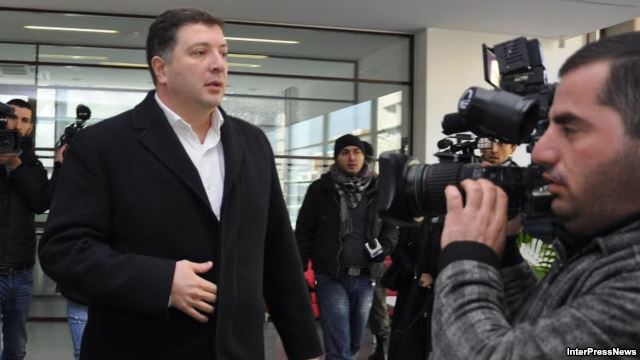
Georgian Politics and Political Prosecutions: The Current State of Play (Part Two)
Publication: Eurasia Daily Monitor Volume: 11 Issue: 4
By:

On December 18, 2013, the prosecution filed charges in a new case against Tbilisi mayor Gigi Ugulava, the last major holdout official from the opposition United National Movement (UNM). The prosecution now alleges, in essence, that Ugulava had misappropriated 48 million lari (some $25 million) from municipal funds to support the UNM’s political activities in 2011–2012. A first-instance court ruled in a midnight session, December 21–22, to remove Ugulava from the mayor’s post at the prosecution’s request. On December 26, the Court of Appeals upheld that ruling. Both courts ruled without hearing oral arguments. Absent a judicial determination of Ugulava’s guilt or innocence under those charges, his removal from office pending such a determination appears to imply a presumption of guilt.
Ugulava was elected by popular vote in 2010 (being the first mayor to be so elected in Georgia). He has successfully presided over the city’s rapid development during his tenure. There is no legal procedure in Georgia for removing a popularly elected mayor in any way other than through another election by popular vote. However, the governing Georgian Dream now proposes legislation that would authorize municipal councils to remove mayors elected by popular vote. In this situation, the prosecution’s motion against Ugulava and the two courts’ rulings can be interpreted technically as suspension from office, rather than removal. But the practical result is the same: ousting a popularly elected mayor by court order, on unproven charges. Meanwhile, Ugulava remains free on bail (Civil Georgia, December 18, 22, 26, 28, 30).
The UNM parliamentary opposition is protesting against this “harmful precedent.” However, an analogous precedent has already been established (in practice, not in law) in early 2013. At that time, UNM mayors were removed from their posts in most parts of the country, following Georgian Dream’s victory in the parliamentary elections, two years ahead of the scheduled municipal elections (see EDM, April 4, 2013).
A first case against Ugulava was filed in February 2013 by the prosecution, but it did not produce incriminating evidence. By the time the second case was filed, Ugulava had obtained court records from Germany showing that Prosecutor-in-Chief Otar Partskhaladze had earlier served a prison sentence in that country for robbery and resisting the police. Ugulava made that record public, which compelled the government to part, however unwillingly, with its chief prosecutor (see EDM, January 7, 8).
Bacho Akhalaia was head of the Ministry of Justice’s Penitentiary Department in 2005–2008, and defense minister in 2009–2012. From November 2012 to date, Akhalaia has continuously been held in investigative or pre-trial detention in four different prosecution cases (matching the number of cases against Vano Merabishvili—see Part One, EDM, January 8). Akhalaia has already stood trial twice, and faces yet another trial.
1) In October 2013, Akhalaia was sentenced to three years and nine months of imprisonment for his role in suppressing the 2006 mutiny of criminal convicts. Seven convicts were killed in that mutiny. As head of the Penitentiary Department at that time (see above), Akhalaia finally broke the organized crime networks that used to control Georgia’s prisons from within and from outside. This consideration led then-president Mikheil Saakashvili in November 2013 (as one of his last decisions as head of state) to pardon Akhalaia. In an open letter explaining his decision, Saakashvili recalled that “thieves-in-law” had responded with threats to organize prison riots and they did so. “Without eliminating their control we could hardly have even dreamt of overcoming crime in Georgia.” Saakashvili also found it unacceptable that some former “thieves-in-law” became the prosecution’s witnesses against Akhalaia (Interpressnews, November 4, 2013).
2) On December 4, 2013, the Court of Appeals acquitted Akhalaia in another case, which stemmed from one incident of maltreatment of a group of six soldiers. The prosecution had charged Akhalaia with physical and verbal abuse of those soldiers, and demanded a prison term of three years and nine months for him. The court of appeals sentenced Generals Giorgi Kalandadze (former head of the Joint Army Staff) and Zurab Shamatava (former commander of the Fourth Brigade) over that same incident on those same charges to that same term of prison. Akhalaia’s acquittal by the Appeals Court may be appealed again to the Supreme Court within a month; but the prosecution (perhaps sensing a weak case) is not known to have appealed (Interpressnews, November 4, 2013).
In an October 10, 2009 cable, released two years later by Wikileaks, United States ambassador John Tefft in Tbilisi reported for Assistant Defense Secretary Alexander Vershbow about then–defense minister Akhalaia’s performance. The report characterized Akhalaia as proactively seeking US military advice, responsive to US guidance, following through with it to reform the Georgian military, and “unafraid to make decisions” (Civil Georgia. September 10, 2011).
3) Akhalaia remains in pre-trial detention under obstruction of justice charges, stemming from the 2006 manslaughter of banking executive Sandro Girgvliani by four police officers, who enjoyed soft treatment in prison while serving their sentences. Vano Merabishvili faces trial on the same charges as Akhalaia does over that case (see Part One, EDM, January 7).
Bacho Akhalaia’s father, UNM parliamentary deputy Roland Akhalaia, has been summoned to the Chief Prosecutor’s Office for questioning. The prosecution has cited complaints from some citizens over alleged misuse of authority by Akhalaia when he was a prosecutor in Samegrelo-Zemo Svaneti Region (2004–2012) (Rustavi-2 TV, December 25, 2013; Interpress, December 26, 2013).




